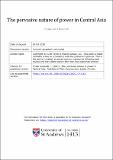Files in this item
The pervasive nature of power in Central Asia
Item metadata
| dc.contributor.author | Costa Buranelli, Filippo | |
| dc.date.accessioned | 2021-10-28T23:37:37Z | |
| dc.date.available | 2021-10-28T23:37:37Z | |
| dc.date.issued | 2021-04 | |
| dc.identifier.citation | Costa Buranelli , F 2021 , ' The pervasive nature of power in Central Asia ' , Problems of Post-Communism , vol. 68 , no. 2 , pp. 92-103 . https://doi.org/10.1080/10758216.2020.1742163 | en |
| dc.identifier.issn | 1075-8216 | |
| dc.identifier.other | PURE: 255221939 | |
| dc.identifier.other | PURE UUID: 9aea202e-c5c4-4dc3-acf0-6a2bb67e723a | |
| dc.identifier.other | ORCID: /0000-0002-2447-7618/work/73293649 | |
| dc.identifier.other | Scopus: 85084266831 | |
| dc.identifier.other | WOS: 000532063900001 | |
| dc.identifier.uri | https://hdl.handle.net/10023/24217 | |
| dc.description.abstract | In International Relations, “Central Asia” and “power” are often linked to either Great Power politics or authoritarianism. Yet, as “power” is a multifaceted component of social life, this paper suggests a comprehensive framework to analyze its different understandings and operations in the region. By adopting the typology of Michael Barnett and Raymond Duvall, the paper has three aims. First, to review the recent literature on power and Central Asia showing that “power” is a pervasive but undertheorized concept. Second, to broaden the understanding of “power” in the region. Third, to encourage reflexivity when it comes to power analysis. | |
| dc.language.iso | eng | |
| dc.relation.ispartof | Problems of Post-Communism | en |
| dc.rights | Copyright © 2020 Taylor & Francis Group, LLC. This work is made available online in accordance with the publisher’s policies. This is the author created, accepted version manuscript following peer review and may differ slightly from the final published version. The final published version of this work is available at https://doi.org/10.1080/10758216.2020.1742163 | en |
| dc.subject | JZ International relations | en |
| dc.subject | T-NDAS | en |
| dc.subject.lcc | JZ | en |
| dc.title | The pervasive nature of power in Central Asia | en |
| dc.type | Journal article | en |
| dc.description.version | Postprint | en |
| dc.contributor.institution | University of St Andrews. School of International Relations | en |
| dc.contributor.institution | University of St Andrews. Centre for Global Law and Governance | en |
| dc.identifier.doi | https://doi.org/10.1080/10758216.2020.1742163 | |
| dc.description.status | Peer reviewed | en |
| dc.date.embargoedUntil | 2021-10-29 |
This item appears in the following Collection(s)
Items in the St Andrews Research Repository are protected by copyright, with all rights reserved, unless otherwise indicated.

